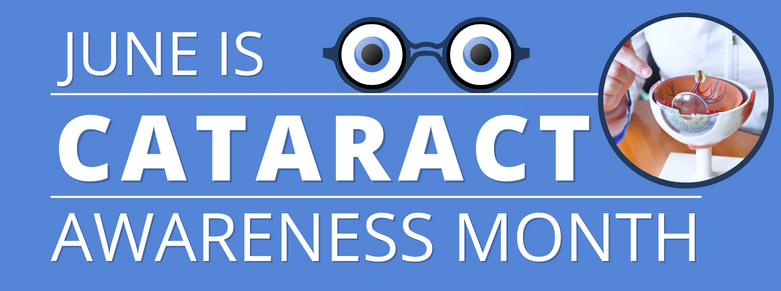
June 21, 2022
Let’s Raise Cataract Awareness!
Let’s Raise Cataract Awareness! June was declared Cataract Awareness Month by Prevent Blindness back in 2013 due to the condition proving to be the leading cause of blindness for many years. According to National Today, cataracts are the most common eye condition reported in people over the age of 40 and around 30 million Americans suffer from cataracts. The good news is that cataract surgery has a 95% success rate and for Iowans, Wolfe Eye Clinic cataract specialists are here to provide their patients with Better Vision for a Better Life ®.
What is a Cataract?
A cataract is the clouding of the eye’s natural lens, which can cause blocked or changed light passages into the eye. The eye’s natural lens is located directly behind the pupil and the colored part of your eye known as the iris. The lens is normally transparent or clear and can fluctuate to move with the eye. However, when a cataract forms it is caused by protein build up collecting onto the natural lens and creates vision loss. This collection begins to stiffen over time and can become very dense. Cataracts are typically due to age and slowly deter vision over time. This is yet another reason why it is important to see your local eye doctor each year for a routine dilated exam to see if there is any change in your vision, or cataract progression. Your eye doctor can help you determine if cataract surgery is needed.

Does everyone have cataracts?
Most cataracts are seen in adults over the age of 40, and in most cases, as we all age we will be susceptible to cataracts. If you have questions about cataracts, your local eye doctor can be very helpful to you in this journey and you can also see some common answers to cataract questions here on our website.
In some cases, cataracts can be congenital and seen in children at birth. According to research, Prevent Blindness states that if a cataract is detected at a young age, that without treatment, cataracts can cause poor development of the visual pathway between the brain and the eyes leading to vision impairment. Cataracts can also be induced by a serious injury. In cases like these it is important for an individual to be seen by a cataract specialist right away, so further damage is not created. Below is a list of further risk factors of cataracts to consider:
- Older age
- Diabetes
- Eye inflammation
- Hereditary influences
- Long-term steroid us
- Long- term exposure to UV rays from the sun or a tanning bed
- Eye injuries or diseases
- Smoking
How do I treat cataracts?
The most successful treatment for cataracts is through a surgical procedure. If your local eye doctor notes that you have a cataract, they can typically help you identify if it may be progressed enough to consider surgery. If so, you can call a cataract surgeon in Iowa at Wolfe Eye Clinic or ask your doctor for a referral for a cataract surgery evaluation.
After a thorough cataract evaluation, if an individual needs cataract surgery they will discuss with their surgeon what options are best for their vision goals. The modern technology of various intraocular lenses (IOLs) provides many options to consider for correction of nearsightedness, farsightedness and astigmatism. Rest assured, at Wolfe Eye Clinic, your cataract surgeon can help you understand what is best for your vision correction and your goals for after cataract surgery. For the right candidates, a patient could even be glasses free or less dependent following surgery.
During cataract surgery, at the time of the treatment the individual will be placed under a local anesthetic and the cataract will be removed by their trusted surgeon. Once the cataract is removed, the natural lens will be replaced by an artificial lens that will stay in place for life. The artificial lens will create clear and crisp vision for the patient once they are fully healed. Cataract surgery is one of the safest surgeries performed today, and the recovery is relatively rapid for most candidates.
Learn more by watching Dr. Steven Anderson speak with WHO Channel 13's Hello Iowa on this important topic here!
“Although cataract is the world’s leading cause of vision loss, it is an eye disease that can be treated successfully with access to quality eyecare services,” said Jeff Todd, president and CEO of Prevent Blindness. “We strongly encourage everyone to educate themselves on cataract and what services are available to see clearly today and, in the years, to come.”
Iowa's Cataract Surgeons
Wolfe Eye Clinic is proud to have some of Iowa’s best cataract surgeons performing surgery throughout the state. If you or someone you know is experiencing any of the following symptoms or have further questions about cataracts call Wolfe Eye Clinic at (833) 474-5850 to schedule an appointment and speak with a cataract specialist.
We offer cataract evaluations in our Ames, Ankeny, Carroll, Cedar Falls, Fort Dodge, Hiawatha (Cedar Rapids), Iowa City, Marshalltown, Ottumwa, Pleasant Hill, Spencer, Waterloo, and West Des Moines offices locations.